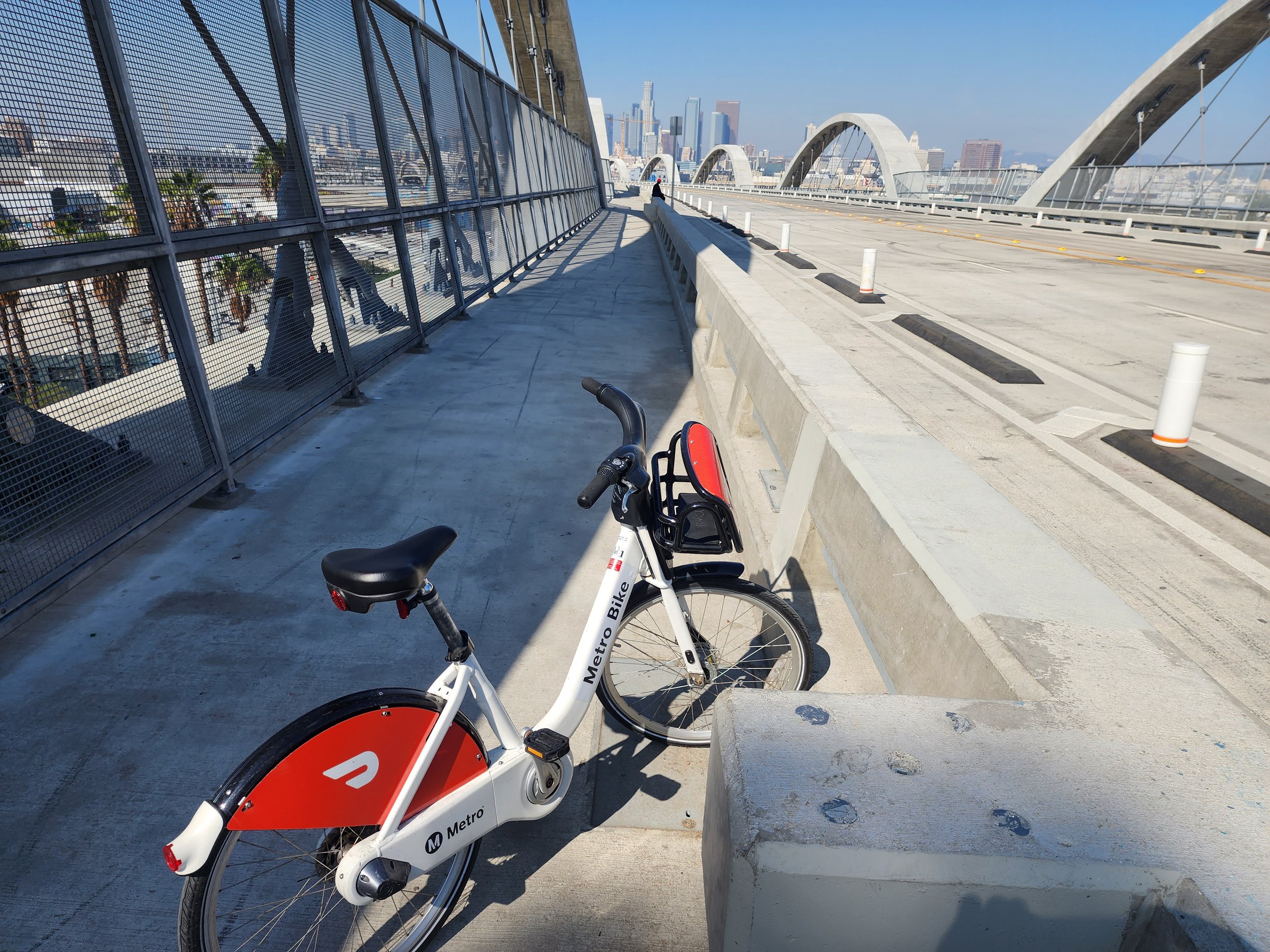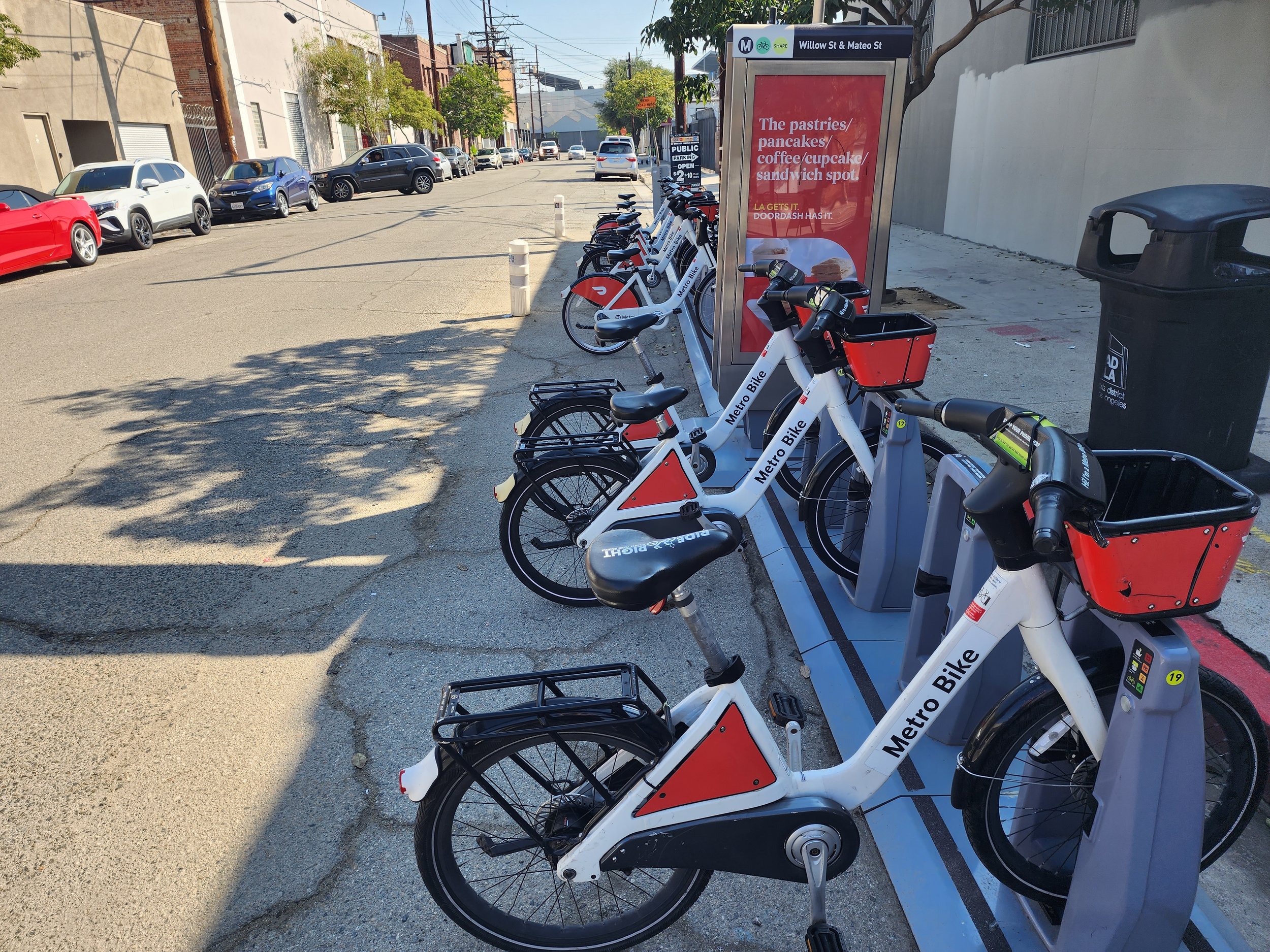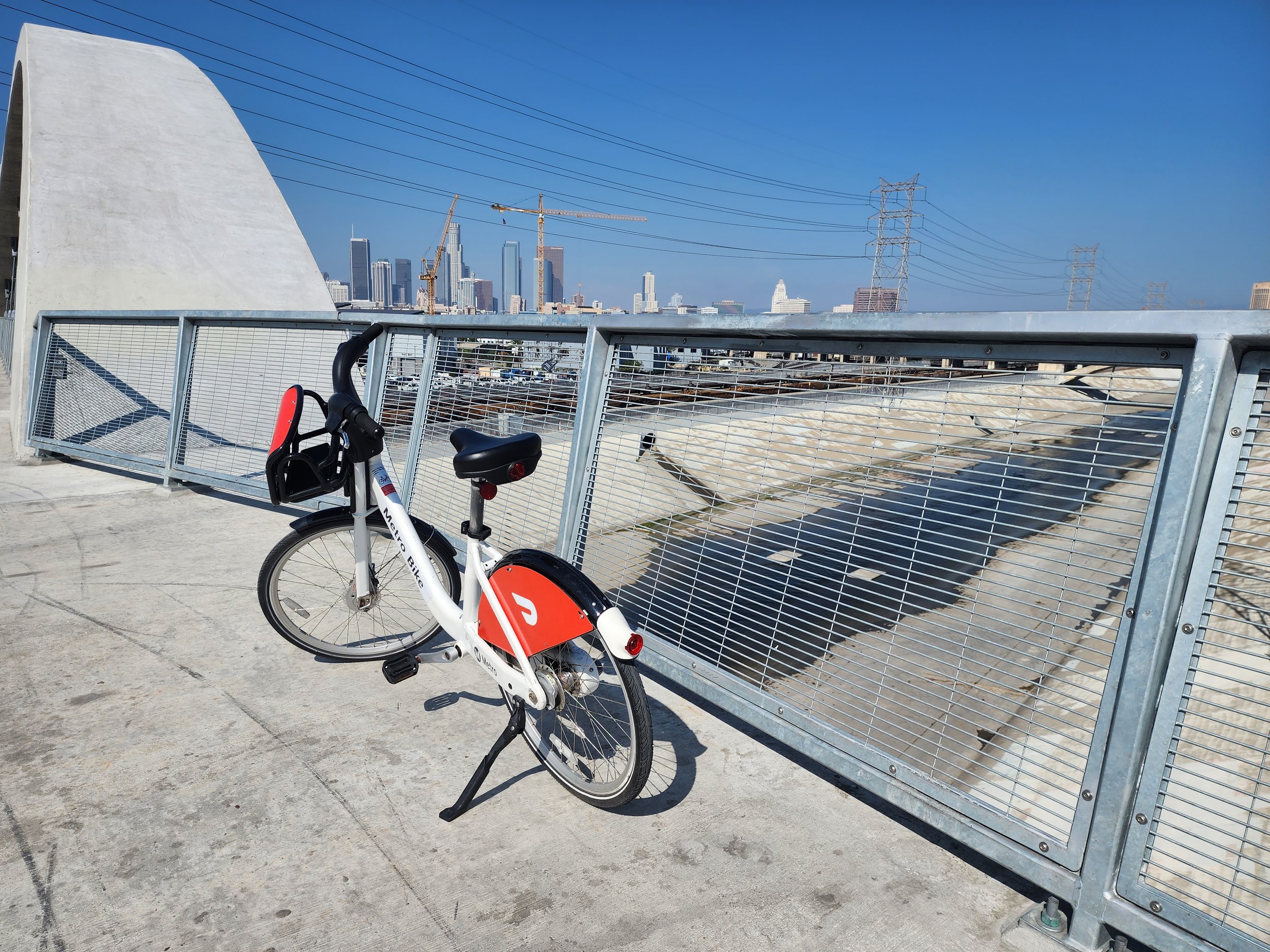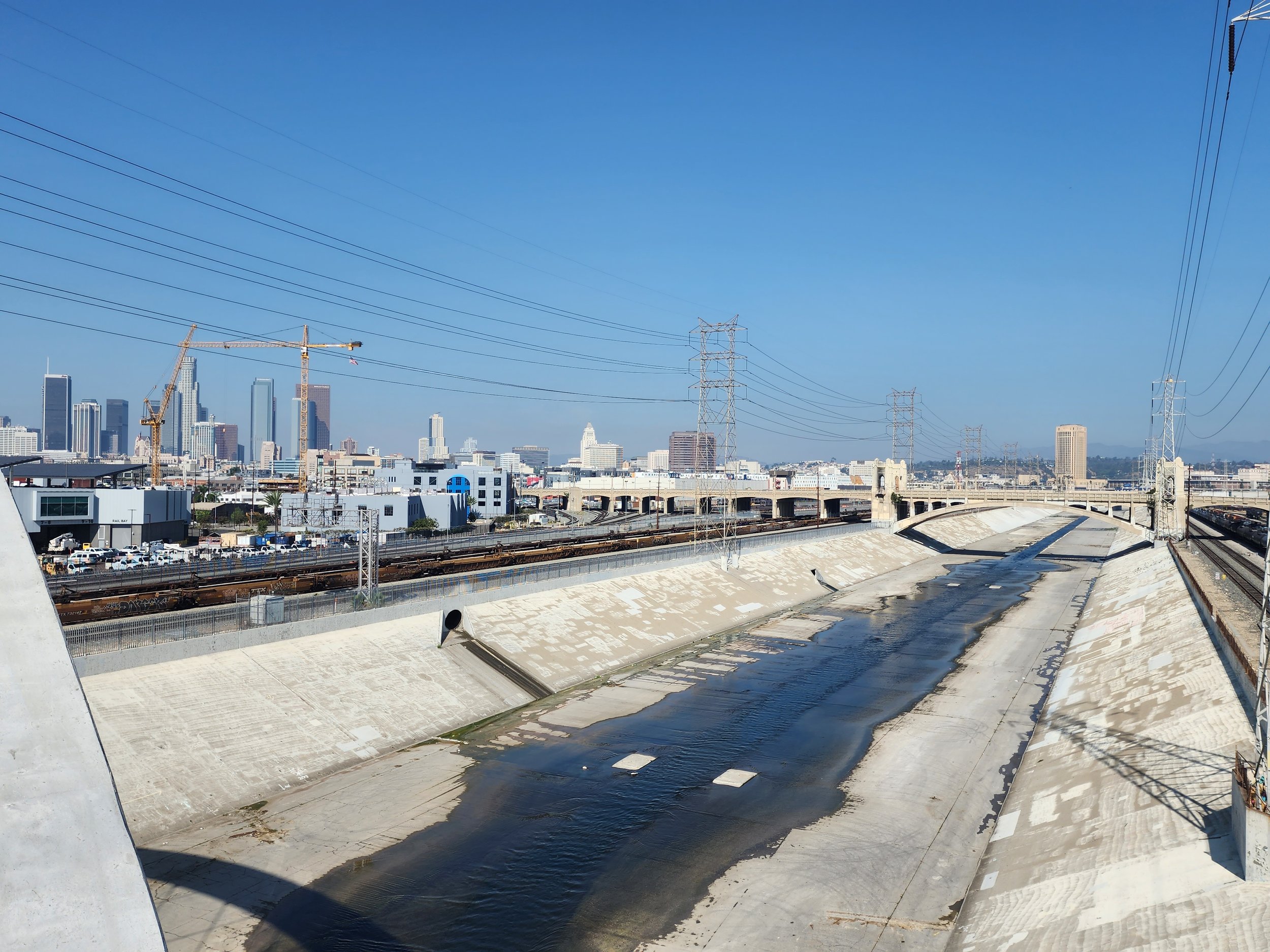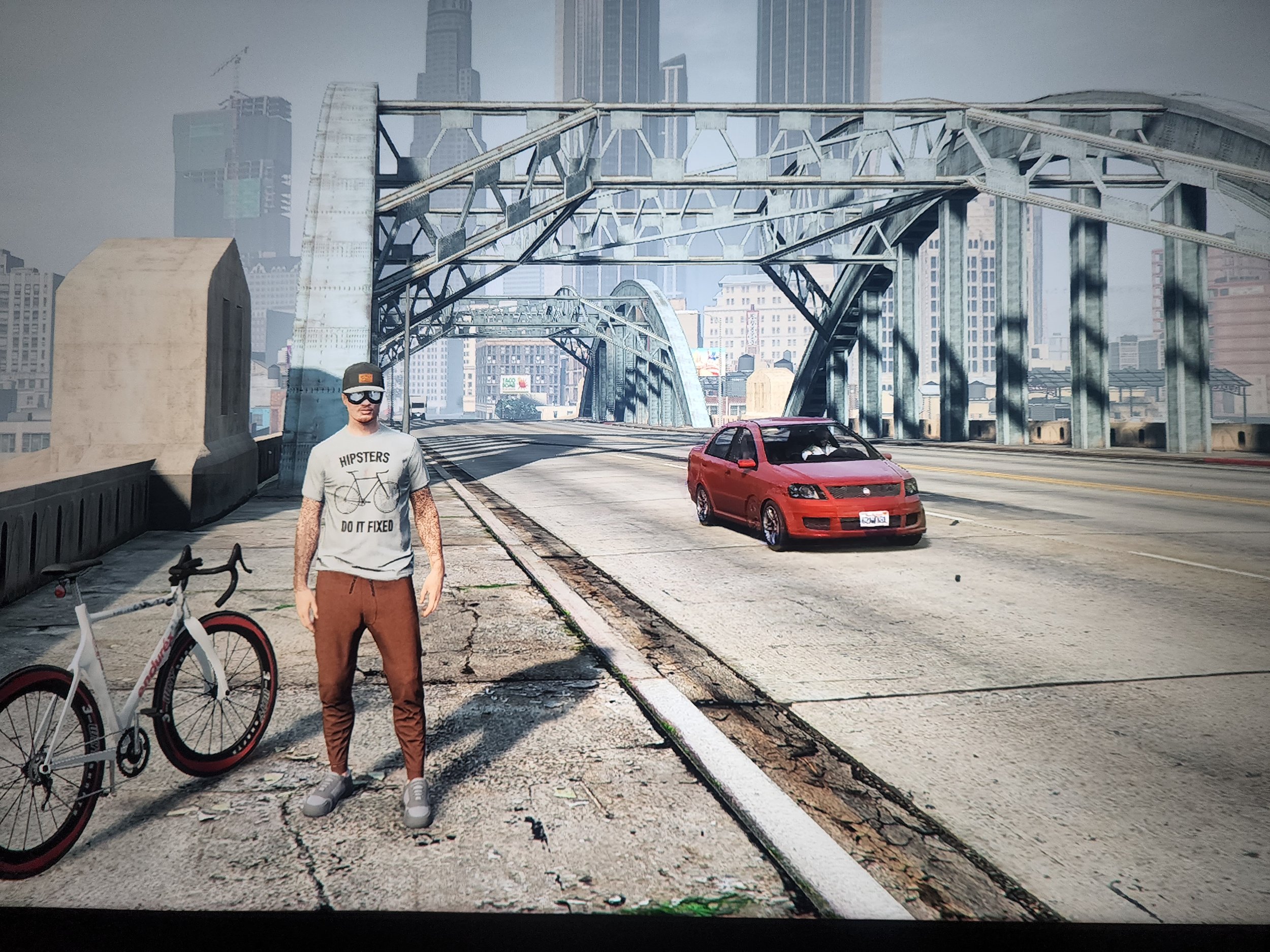Last month the city of Los Angeles celebrated the opening of the new 6th Street Viaduct bridge. The new structure replaces the original 6th Street bridge, an iconic landmark that spanned the L.A. river, connected downtown to Boyle Heights, and appeared in numerous films and other media. The original bridge was constructed in 1932 and demolished in 2016 due to structural problems.
The fanfare around the viaduct’s opening was quickly replaced by media coverage of illegal activity and street takeovers bringing traffic across the span to a standstill. In addition to reported road races, spinouts, and wheelie exhibitions, the new bridge was soon employed for a variety of unintended uses:
Video on social media from last weekend showed drivers spinning their wheels and performing other antics on the bridge, leaving the pavement scarred. Some people even crawled onto the ribbon-like arches that line the bridge to get elevated views of the action. Other isolated incidents have included a man getting a haircut in the middle of the bridge last Wednesday and another shadow boxing while wearing a red cape.
Reading about the commotion – and the flurry of responses – from afar, I was tempted to catch a flight to L.A. for a first-person perspective of the proceedings before the proposed preventive measures could be implemented (I had to settle for visiting the virtual ghost of the original bridge in Grand Theft Auto V, see photo above). The new 6th Street Viaduct, the disputes over its utilization, and the discourse around the controversy represent a confluence of urban communication issues. In the first month of its opening, the bridge has supported a communicative convergence of contrasting visions of city form and function.
On one hand is the bridge as symbol, as a medium for communicating urban identity and values. In response to the “unruly” behavior overtaking the new viaduct Los Angeles city council member Kevin de León highlighted the bridge’s symbolic function as an iconic landmark communicating an elite cosmopolitan status:
He predicted the bridge would become as famous as Griffith Park Observatory and Venice Beach. “We do have a new star in town,” he said. “It’s something all Angelenos deserve. This would be a symbolic icon for not just the region ... but for the entire world.”
This perspective attests to the role of iconic architecture (or “starchitecture”) for communicating urban distinction and “world city” status, as well as acting as lightning rods for attracting additional investment. But other Angelenos see the new bridge as symbolic of the attendant processes of gentrification. As stated in one community organizer’s account:
I begin to explain once again that the new Sixth Street Bridge Project is often hated for the wrong reasons. Though mostly because many people are quite convinced that this new bridge is a symbol of gentrification and displacement of a culture-rich community. And its hard to see how not to get that impression, given the characteristics of this project and the inequity in the end results.
From this perspective the viaduct is not merely a route for moving traffic between downtown and Boyle Heights but is a corridor for carrying capital into new extractive territories.
Beyond the bridge’s symbolic status as communication medium, the material form of the viaduct also functions as an infrastructure, not only for traversal but for expression. The aforementioned councilmember de León has targeted graffiti on the new bridge, asking the city council to allocate additional funds for graffiti removal.
The proposal to clean up graffiti passed 3-1 after De Leon and San Fernando Valley area City Councilman John Lee got into a debate, with Lee saying that spending that kind of money downtown takes funding away from other districts in Los Angeles that are trying to clean up their own local graffiti.
De León’s comments advocating for residents to take “collective responsibility as stewards of the bridge” moved beyond graffiti to the range of behaviors by which individuals were using the bridge to get their fifteen minutes of fame:
De León urged people to “step up and do everything within our power to make sure that we don’t allow a small group of individuals that are looking for their virtual fame to go viral on Instagram, TikTok or Facebook or Twitter — whatever it may be, for them to hijack the bridge that ultimately, at the end of the day, is the people’s bridge. This bridge belongs to everybody.”
There’s a lot to unpack here. De León’s emphasis on collective responsibility and assertion that “the bridge belongs to everybody” are ripe for analysis, but in the particular context of graffiti I can’t help but think of Richard Sennett. Sennett’s prolific career of urbanist writings began with the influential articulation of the “uses of disorder” for city life. In later writings Sennett addressed graffiti with a somewhat ambivalent attitude (to my reading anyway) that viewed it as a form of private address indifferent to the general urban public, and expression of an “aggressive” relation to the environment.
But De León also references the role of mediation in drawing crowds to the bridge, particularly the influence of social media. In our mediated era the opening of a new urban landmark offers an occasion not only for individual exploration but for seizing the novel infrastructure as a platform for creating “content” to add to the endlessly circulating stream of online images. The ever proliferating ways in which urban environments are mediated represent a wrinkle in Sennett’s theories of disorder and individual expression, as social media participation has incentivized new ways of relating to the urban environment.
A letter to the editor published in the July 27th Los Angeles Times shifted blame for the bridge chaos away from the unruly individuals taking over the traverse to the designers of the new viaduct who “forgot to include human beings” in their plans:
The resulting design was full of what engineers call “affordances” — design aspects that vividly suggest how an object or space should be used. They invite (afford) an almost inevitable human response: An elevator button affords you to push it, a chair’s design affords you to sit on it (or avoid it), and wide-open lanes afford teenage boys the irresistible impulse to drag-race.
The letter writer is evincing a perspective of spatial determinism that closely accords with Keller Easterling’s writings on medium design, and echoes insights of many antecedent urbanists. The same day the letter was published the Times editorial board issued a statement that expressed similar sentiments:
Instead, focus on the crowds of pedestrians, cyclists, skateboarders, Instagrammers who’ve flocked to the bridge and made it their own. Despite less than ideal conditions (the speeding cars and the flimsy “protected” bicycle lanes), the 6th Street Viaduct has become a spot for family strolls, bike rides, scenic views, even quinceañera photos and a podcast recording. This is no mere roadway connecting Boyle Heights and downtown. It’s an opportunity to rethink L.A. transportation infrastructure and public space. The viaduct was built for cars, but it should be reclaimed for people.
Again, the editors advance a vision of public space that is designed for people rather than cars, an argument that has a long history in American urban planning. They also come close to positing a Lefebvrian call for a right to the city. The statement closes by imagining the possibilities for the new bridge that goes beyond its exchange value as a symbolic icon to its latent use value as a cultural space:
Imagine having a safe, beautiful connection between the two communities. The first chaotic weeks of the new 6th Street Viaduct could turn into a rare and wonderful opportunity. The bridge is already a visual landmark. What if it became a cultural landmark as well — marking the beginning of a new era in Los Angeles, one that elevates people over cars.
The quick-fix solutionist strategies that were proposed (and possibly already implemented as of this writing) to restore order on the viaduct were predictable: speed bumps in the traffic lanes and additional fencing along the bridge sides. These “solutions” are just an extension of both defensive architecture in urban space and myopic mobility approaches. The new 6th Street Viaduct is an event, a new urban space that has already changed the urban landscape and altered the Los Angeles skyline. But the discursive space that its reception has opened reveals the broader scope of its transformative potential.
